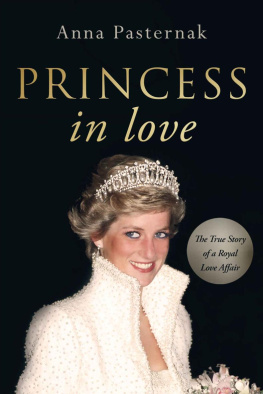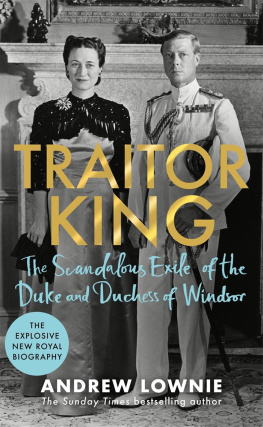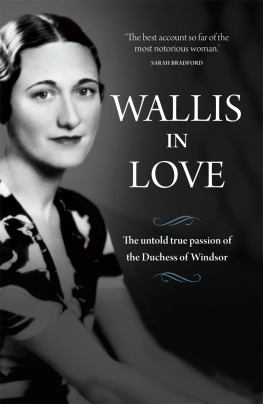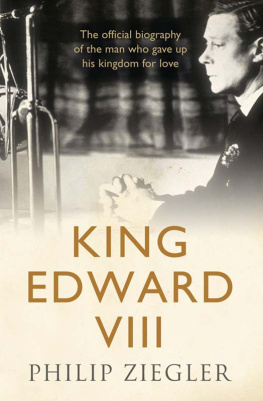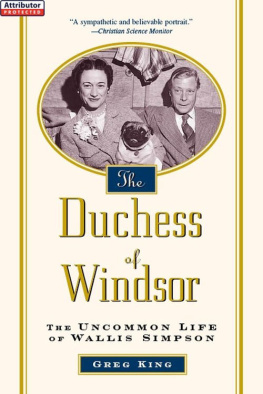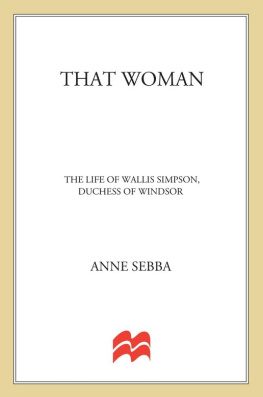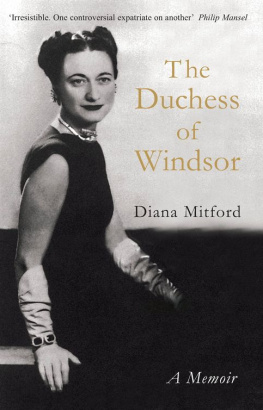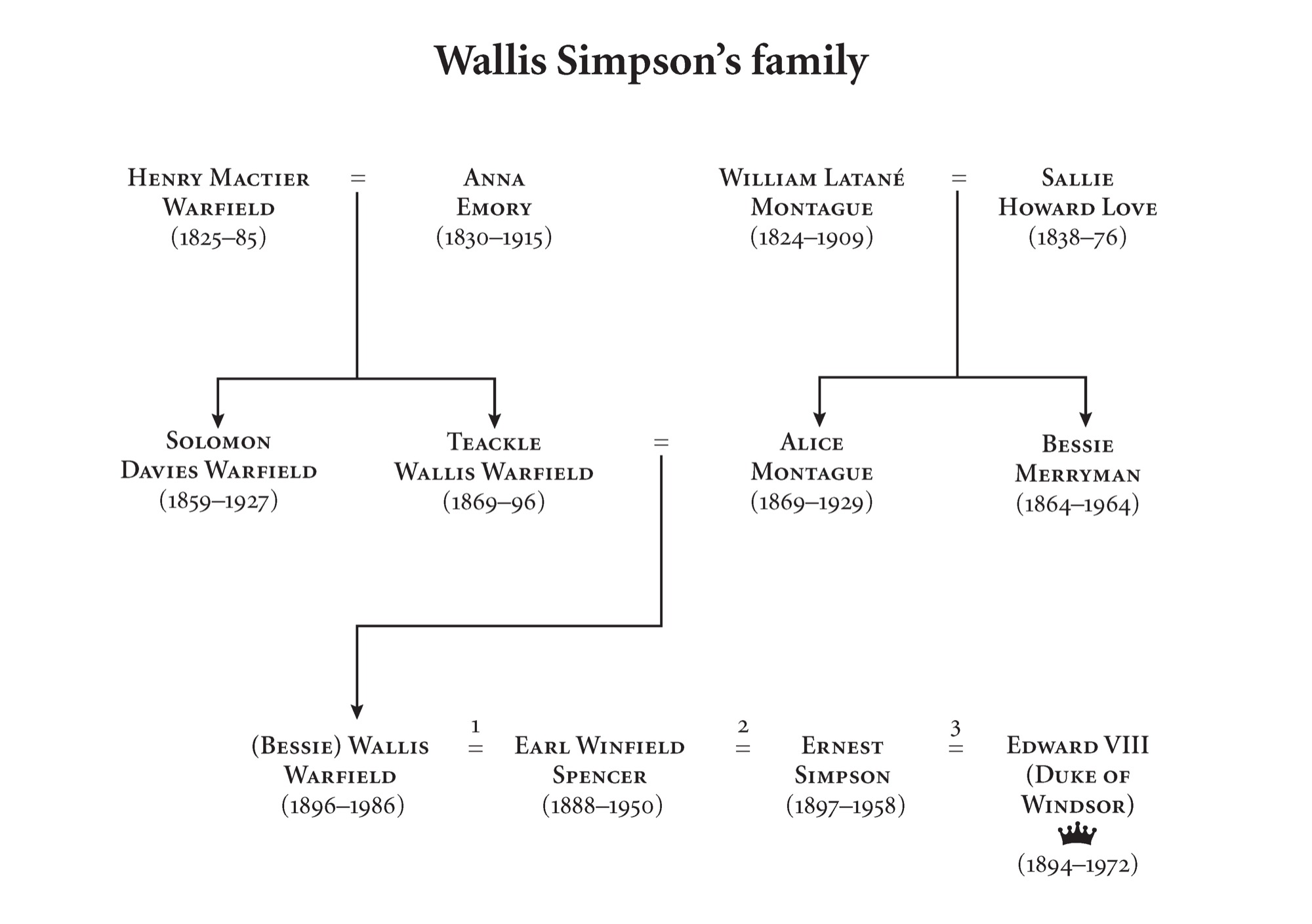Thank you for downloading this Simon & Schuster ebook.
Get a FREE ebook when you join our mailing list. Plus, get updates on new releases, deals, recommended reads, and more from Simon & Schuster. Click below to sign up and see terms and conditions.
CLICK HERE TO SIGN UP
Already a subscriber? Provide your email again so we can register this ebook and send you more of what you like to read. You will continue to receive exclusive offers in your inbox.
We hope you enjoyed reading this Simon & Schuster ebook.
Get a FREE ebook when you join our mailing list. Plus, get updates on new releases, deals, recommended reads, and more from Simon & Schuster. Click below to sign up and see terms and conditions.
CLICK HERE TO SIGN UP
Already a subscriber? Provide your email again so we can register this ebook and send you more of what you like to read. You will continue to receive exclusive offers in your inbox.
To Wallis,
Her Royal Highness the Duchess of Windsor
I who had sought no place in history would now be assured of onean appalling one, carved out by blind prejudice.
The Duchess of Windsor
The fault lay not in my stars but in my genes.
HRH the Duke of Windsor
PROLOGUE
The Heart Has Its Reasons

Once upon a time, there was a charming, handsome prince. Whenever he visited even the farthest reaches of his kingdom, his people flocked to see him. He was adored the world over. Everyone expected him to marry a pretty, well-bred English virgin who would one day become Queen of England and its vast empire. But, when the prince was thirty-seven years oldhaving previously shown no sign of wanting to get marriedhe fell in love with an odd-looking, twice-divorced American. No one thought that the affair would last, so everyone close to him kept quiet about it. When the princes father, the king, died five years later, the prince inherited the Crown. Courtiers assumed that the new king would find a suitable young bride. To their horror, he said that he could not continue to be king without the American woman he loved by his side and that he intended to marry her. Everyone in the royal palaces, the prime minister, the government, the Church, were shocked. They accused the wicked witchdivorce of being a sorceress who had cast a spell over their poor, gentle prince in order to become queen. The kings ministers told him that if he married this terrible woman, he would have to surrender the Crown.
But instead of renouncing his love, the king sacrificed his whole realman empire of over five hundred million peopleto be with her. He only ruled for 326 days, making his reign one of the shortest in his countrys history. His devoted subjects were heartbroken. They blamed the ugly witch for taking their beloved sovereign away from them. His family banished him from the land, leaving him free to marry the woman he loved. Denied royal status, the couple spent the rest of their lives in exile, roaming the world aimlessly, sad that they could not return to the kings homeland and to the little castle that he adored. The world, meanwhile, imagined that this was the Greatest Love Story Ever Told and that husband and wife went on to live Happily Ever After.
* * *
The story of the abdication of King Edward VIII and his marriage to Wallis Simpson has been told so many times that it has taken on the character of a fairy tale. Like fairy tales, much of what we are repeatedly told is in fact make-believe. The most scandalous love affair of the twentieth century may have softened into a romantic legend with time, but dark myths still endure. The dashing young prince, whose charisma and glamour ensured him the status of a movie star, gave up the greatest throne in history, as Churchill called it, to marry his one true love, an American divorce. Surely there can be no greater act of sacrifice than to give up such power, privilege and adoration for love? And for a woman whose appeal was such a mystery to most.
Edward Albert Christian George Andrew Patrick David Windsor was considered the worlds most eligible bachelor. Society hostess Elsa Maxwell first met the Prince of Wales in the early 1920s at Mrs. Cuckoo Bellevilles house in Manchester Square. He was a gay, golden-haired, blue-eyed, debonair Prince Charming, the most famous celebrity in the world, who seemed a Raphael angel grown up. He projected an aura of glamour that was as unmistakable as it was authentic.
Men were equally beguiled. Even the senior palace courtier, Alan Lascelles, known in royal circles as Tommy and later a fierce critic of the former king, gushed in 1921 that the heir to the throne was the most
When news of Wallis Simpsons affair with Edward broke from under a media blackout in 1936, what seemed unfathomable was why, when the Prince of Wales could have had any beauty he desired, he was smitten with an unconventional, severe-looking American two years his junior with two living husbands. So much gossip and innuendo have been leveled at Wallis that it has become near impossible to discern the real woman or to hear her authentic voice amid the cacophony of condemnation. As her friend Herman Rogers said of her in 1936, much of what is being said concerns a woman who does not exist and never did exist.
Ever since, we have been overfed a diet of fantastical slander: that Wallis was really a man; that she had a perverse psychosexual hold over the prince; that she used manipulation and feminine wiles to lure him into abdicating; that she was a ruthless, cold, ambitious bitch who schemed from the outset to be Queen of England. The well-worn view is that she alone was responsible for almost bringing down the British monarchy, triggering a constitutional crisis caused by her determination to marry the heir apparent. We have experienced her so fully as Machiavellian through others projections and prejudices, through misogynistic memoirs, biographies and unflattering portrayals, that she has become a caricature of villainous womanhood. Devoid of warmth, emotional complexity and a beating heart, she remains the brittle victim of salacious chatter and brutal character assassination many decades after her pitiful death.
Instead of simply belittling Wallis and defaming her reputation, we might try to understand this modern, intelligent, remarkable woman and the impossible situation she was placed in. She was, in fact, very warm, funny, irresistibly charming, loyal and dignified to the end. Adored by her many friends, she was written off by a cunning, powerful British establishment that sought to destroy and diminish her; men like Tommy Lascelleswho famously dismissed Wallis as shop-soiled with a voice like a rusty sawthe British prime minister Stanley Baldwin; and Cosmo Lang, the archbishop of Canterbury.
However, far from being the villain of the abdication, Wallis was the victim. Instead of pushing for Edward to leave the throne, she had tried to prevent it. What most of her detractors fail to acknowledge is that she never wanted to marry Edward. Naturally she was initially flattered by his attention; as an American woman living in London, surrounded by society hostesses and social climbers, she felt giddy to be included in His Royal Highnesss elegant and rarefied circle. What woman would not have been beguiled by the princes unmistakable aura of power and authority?
Next page


